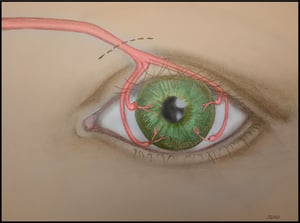Teaming Up to Prevent Vision Loss
Plastic and Reconstructive Surgeons Dr. Andrew Elkwood and Dr. Zuhaib Ibrahim have teamed up with Dr. Ravi Patel, an Ophthalmologist specializing in Cornea Surgery, to offer a cutting-edge procedure for patients who have lost sensation in their cornea (corneal anesthesia). This procedure—known as corneal neurotization surgery, is a minimally invasive nerve transplant procedure that returns feeling to a patient’s eye. Corneal neurotization surgery is currently offered by only a few surgeons in the United States and around the world.
Corneal anesthesia may be caused by infection (such as Herpes Zoster), diabetes, trauma, or surgery, and it can be very difficult to manage. The corneal sensation is a necessary component of normal protective reflexes, without which the cornea is susceptible to repeated damage. Loss of corneal sensation leads to corneal scarring and, ultimately, vision loss.
Corneal neurotization surgery uses a sural nerve graft (taken from a patient’s calf), transplanting it above the eye on the side of the patient’s face that still has feeling and grafting it onto an existing nerve. This grafted nerve is then tunneled under the skin of the forehead, and new nerve endings are connected to the damaged cornea (see illustration). This procedure utilizes established nerve surgery techniques to provide a new promising approach to corneal anesthesia.
This surgery has been found to result in the restoration of protective corneal sensation, prevention of further scarring of the cornea, and ultimately preserved vision. Corneal neurotization surgery offers a promising option for patients affected by corneal anesthesia.
If you are someone you know is affected by this condition, contact us today to learn more about how our reconstructive surgeons may be able to help prevent vision loss.




